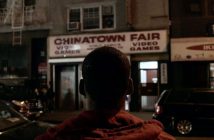
Editor’s Note: Sausage Party opens in wide theatrical release today, August 12, 2016.
Jean-Paul Sartre once said, “Hell is other people.” In Sausage Party, Seth Rogen and Evan Goldberg’s raunchy, R-rated animated comedy (Greg Tiernan and Conrad Vernon co-directed from a screenplay credited to Rogen, Goldberg, Kyle Hunter, and Ariel Shaffir), hell isn’t other people. Hell is people, full stop. Humans are the (super) villains, the false gods, the oppressors. They’re (we’re) the consumers, taking the lives of sentient, self-aware food, including Rogen’s Frank, a smarter than the average hot dog who eventually questions the meaning of his existence and the comforting lies he’s been told and believes, leading him on a journey not just to find himself, but to find the truth with a capital T and impart that truth prophet-like to the blissfully unaware, blissfully ignorant foodstuffs and household products who eagerly wait to be purchased by their “gods” (humans) and taken to the Great Beyond (heaven). The truth is far from palatable for Frank and the inhabitants of the Shopwell supermarket they call a temporary home. There is no Great Beyond, no heaven, just a painful, excruciating demise and the infinite, cosmic void.
If all the talk about the Great Beyond sounds heavy, especially for an animated comedy that’s been marketed for its freeform, restriction-free crudity, vulgarity, and obscenity, then Sausage Party is heavy, albeit with the usual lack of subtlety and nuance typical of Rogen’s comedies.
 When we first meet Frank, he’s all about getting up into the love of his short, brief life, Brenda (Kristen Wiig), a voluptuously shaped bun. Consummation of his relationship with Brenda in the Great Beyond is all he thinks about and talks about to the hot dogs in his pack. He might be more horn dog than hot dog, but he’s a decent, humane sort, stepping in to help Barry (Michael Cera), a height-challenged hot dog with, naturally enough, performance anxiety issues. Still, for Frank and Friends, it’s all about the gods picking them and taking them to the Great Beyond. When, however, a Honey Mustard bottle (Danny McBride) with PTSD (he’s been to the outside world and back and knows the horrible, gruesome truth about the gods and the fate that awaits them all), loses his head (literally), a catastrophe – more like cart-astrope – on the level Saving Private Ryan’s Omaha Beach landing (a Sausage Party high point in deadpan hilarity) turns Frank, Brenda, and Barry’s world upside down. Frank gets an unintentional antagonist in Douche (Nick Kroll), a literal douche who makes it his life’s goal to destroy Frank for separating him from his purpose.
When we first meet Frank, he’s all about getting up into the love of his short, brief life, Brenda (Kristen Wiig), a voluptuously shaped bun. Consummation of his relationship with Brenda in the Great Beyond is all he thinks about and talks about to the hot dogs in his pack. He might be more horn dog than hot dog, but he’s a decent, humane sort, stepping in to help Barry (Michael Cera), a height-challenged hot dog with, naturally enough, performance anxiety issues. Still, for Frank and Friends, it’s all about the gods picking them and taking them to the Great Beyond. When, however, a Honey Mustard bottle (Danny McBride) with PTSD (he’s been to the outside world and back and knows the horrible, gruesome truth about the gods and the fate that awaits them all), loses his head (literally), a catastrophe – more like cart-astrope – on the level Saving Private Ryan’s Omaha Beach landing (a Sausage Party high point in deadpan hilarity) turns Frank, Brenda, and Barry’s world upside down. Frank gets an unintentional antagonist in Douche (Nick Kroll), a literal douche who makes it his life’s goal to destroy Frank for separating him from his purpose.
Frank and Brenda are left to fend for themselves outside of their wrappers, while Barry makes it to the outside world and a god’s dining table. Barry learns the truth the hard way, surviving on his wits and luck while he tries to engineer a way back to Shopwell and Frank. Frank and Brenda go on the proverbial journey, Frank to find the answers to their fates, with Brenda, a true believer until the (near) end, accompanies him reluctantly. Along the way, they meet Teresa (Salma Hayek), a taco with an immediate crush on Brenda, Sammy Bagel Jr. (Edward Norton), a nebbishy, Woody Alone-clone, and Vash (David Krumholtz), an extremist, anti-Semitic Muslim lavash who fervently believes he’ll be bathed in extra-virgin olive oil when he reaches the Great Beyond. The ethnic stereotypes don’t stop there, of course. Frank eventually gets a sit-down with the supermarket’s three wise “men,” Firewater (Bill Hader), a Native-American shaman of some sort, Mr. Grits (Craig Robinson), a cracker-hating African-American box, and Twinkie, an ambulatory “twink” (a young, effeminate gay man). They offer Sausage Party’s most pointed critique against organized religion: Comforting fictions and lies instead of the harsh, uncompromising reality of an impersonal, god-free universe.
Jean-Paul Sartre once said, “Hell is other people.” In Sausage Party, hell isn’t other people. Hell is people, full stop.
If all the talk about the Great Beyond sounds heavy, especially for an animated comedy that’s been marketed not for its story, themes, or subtext, but for its freeform, restriction-free crudity, vulgarity, and obscenity (just wait until the literally climactic, no-holes-barred orgy), then Sausage Party is heavy, albeit with the usual lack of subtlety and nuance typical of Rogen’s comedies. Rogen and Goldberg have some major, if obvious, points to make – and score – against organized religion (Christianity, Judaism, and Islam, Jewish) and fascistic ideologies (sauerkraut envisioned as “juice”-hating Nazis), but they rarely lose sight of the need to keep moviegoers engaged and entertained through a steady stream of filthy, obscene jokes and physical gags that will make even the most jaded, cynical moviegoer gasp in stunned disbelief. That the F-bomb-heavy jokes and gags begin to become repetitive the halfway mark and don’t pick up again until the final, inspired meta-moments is almost forgivable, though the occasionally stale pop-culture jokes and blunt-edged, purposely offensive ethnic stereotypes aren’t.
An exercise in freeform, restriction-free crudity and obscenity, Sausage Party has a lot to say about organized religion, though the vulgarity -- and the purposely offensive ethnic stereotypes -- go stale quickly.



